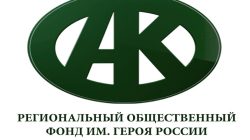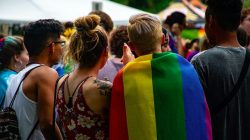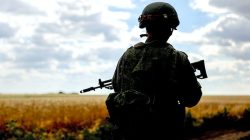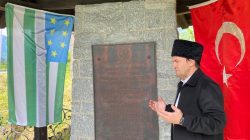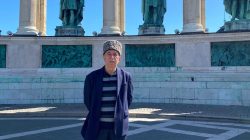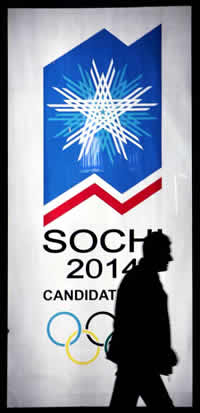
Maikop – Circassian associations in the North Caucasus have spoken out against staging the Winter Olympics in Sochi in 2014, arguing that the games will take place on land where their ancestors were subject to ethnic cleansing.
The strong stand taken by activists comes as the political leader of Adygeia, a Circassian autonomous region in Russia, has backed the games. Announcements made in Moscow about the Winter Olympics have failed to mention the Circassians’ historical presence along the Black Sea coast, where Sochi is located.
"We support the Olympic movement, as its principles are based on strengthening peace and friendship between nations," Murat Berzegov, the leader of the Circassian Congress of the Republic of Adygeia, told IWPR. "However, I cannot see that these principles are compatible with holding the Olympic Games at the scene of a genocide, at a time when the vast majority of the indigenous population are in exile outside their homeland."
Until the mid-19th century, Sochi and the surrounding area was inhabited by the Circassians and their kin, the Ubykhs. Both peoples put up strong resistance to imperial Russia’s expansion into the Caucasus. Krasnaya Polyana, in the hills not far from Sochi. was the site of the Circassians’ final defeat in 1864.
After 1864, hundreds of thousands were deported or fled in terrible conditions to the Ottoman Empire. As many as 4.5 million Circassians now live outside Russia, mainly in Turkey and the Middle East. The Black Sea coastal strip which includes Sochi was more or less depopulated.
Those who remain in Russia are concentrated in three autonomous republics – Adygeia, Kabardino-Balkaria and Karachai-Cherkessia – where they go by the names Adygei, Kabardans and Cherkess, respectively (the Balkar and Karachai are distinct from the Circassians).
The small Ubykh ethnic group has died out, while a once-powerful Circassian group, the Shapsugs, now amount to a few thousand people in Russia’s Krasnodar region.
Berzegov says the Russian government has done nothing to encourage the Circassian diaspora to return to their former homeland. According to the Committee for Ties with Compatriots, just 600 Circassians have returned to Adygeia over the past 15 years.
Circassian organisations have called on the Russian government to recognise the disastrous conclusion of the 19th century conflict as "genocide", without success.
The Winter Olympics announcement has crystallised discontent around the issue.
"It is surprising that this country’s leadership can easily invest the astronomical sum of 12 billion dollars to build Olympic facilities, but won’t invest a single dollar in resolving the Circassian question," said Berzegov.
His claims have been backed by a number of diaspora Circassian groups which have filed protests with the International Olympic Committee.
Asked about the issue in a live phone-in, Russian deputy prime minister Alexander Zhukov said the issue was "unexpected".
"Sochi is a multi-ethnic city where many nationalities live in peace and harmony," he said. "The Olympics will attract big investment into the region and the improving economic situation will reduce social tensions."
Tensions between Circassians and the Krasnodar regional administration, which includes Sochi, have been running high. Last year, plans to remove Adygeia’s autonomous status and incorporate it administratively into Krasnodar region were shelved, but there is still lingering bitterness over the issue.
"Investing billions in Sochi will create an even greater economic gap between these neighbouring regions [Krasnodar and Adygeia], providing new arguments in favour of abolishing the republic on the grounds that it is an economic failure," said the deputy chairman of the International Circassian Association, Nalbiy Guchetl.
Another Circassian organisation, Adyge Khase, has not expressed outright opposition to the Winter Olympic plans, but argues that symbols of Circassian history and culture should be included in the format, as Australia did with its indigenous population in 2000.
However, Adyge Khase activist Arambiy Khapai remains personally opposed to the Sochi games.
"We’ve been disappointed with the news coverage of the forthcoming Olympic Games," he said. He noted that official reporting on the Sochi area as the games’ location noted that it was part of the ancient Colchis, and referred to it being "liberated" from Ottoman Turkey.
"But not a word is said about the Circassians," complained Khapai.
Circassian historians say history is being rewritten. For instance, the claim is now being advanced that the Black Sea coastal strip around Sochi became part of Russia in 1829, the argument being that it was among the territories that Turkey ceded to Russia under the Treaty of Adrianople.
Asker Panesh, a researcher at the Adygeian Institute for Humanitarian Studies, said the area was never part of the Ottoman empire, and 1829 in fact marked the beginning of outright war between Russia and the Circassians.
"Turkey could not have ceded what did not belong to it and the Circassians did not recognise this agreement," he said.
Moscow’s re-interpretation of the Treaty of Adrianople coincides with another controversy concerning the Circassians – the celebrations currently being held across the North Caucasus to mark the 450th anniversary of their "voluntary union" with Russia in 1557.
Circassian organisations point out that by an irony of history, the 2014 Olympic Games will mark the 150th anniversary of the Circassians’ defeat by Russia in 1864.
Local environmentalists have also objected to the choice of Sochi for the games. Tatyana Lysenko, deputy chairwoman of the Maikop Society for the Protection of Nature, said that the construction involved will damage the unique landscape of the North Caucasus.
"For the first time in history, Olympic facilities will be built specially-protected territories that are a UNESCO natural heritage site," she said.
Zamir Shukhov, the president of the World Adygeian Brotherhood, argues that the construction work will endanger important burial sites. There have been calls for an archaeological survey to be carried out before any building work begins.
A different note is being struck by the authorities in Adygeia, where President Aslan Tkhakushinov congratulated Krasnodar region for winning the Olympics, and has promised the use of the snow that covers the Lago-Naki plateau all the year round.
"The Olympic Games bring countries a colossal income," said Tkhakushinov. "The infrastructure of Kuban [Krasnodar], of which Adygeia is part, will receive immense financial inflows. It’s probably worth taking a look at this side of the coin as well. The Olympics should not hurt anyone’s national interests. They should be a festival."
Circassian Congress leader Berzegov accepts that the games are now inevitable, but says they may at least help inform the world about the injustices visited on his people.
"The Circassians may use the Sochi Olympics as a means of spreading information and attract the international community’s attention to the problems of the Circassian ethnic group and to the recognition of the genocide," he said.
Azamat Bram is the pseudonym of a freelance journalist working in the North Caucasus.
Source: IWPR- CAUCASUS REPORTING SERVICE, No. 413, October 5, 2007
By Azamat Bram




